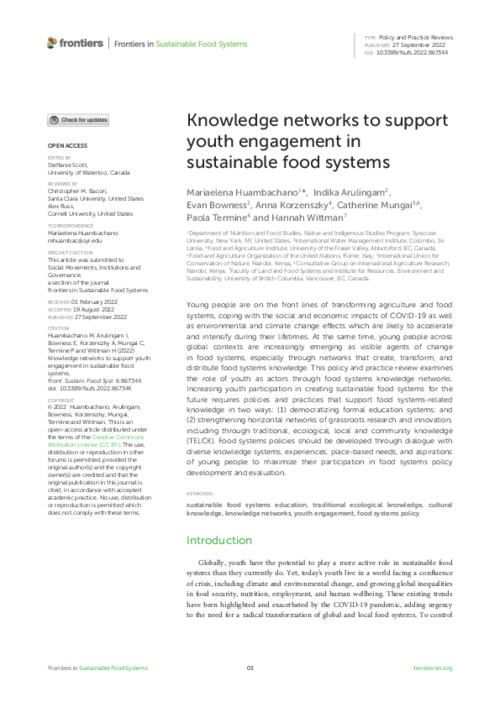Please use this identifier to cite or link to this item:
https://hdl.handle.net/20.500.12348/5560
Knowledge networks to support youth engagement in sustainable food systems
| dc.creator | Huambachano, M. | en_US |
| dc.creator | Arulingam, I. | en_US |
| dc.creator | Bowness, E. | en_US |
| dc.creator | Korzenszky, A. | en_US |
| dc.creator | Mungai, C. | en_US |
| dc.creator | Termine, P. | en_US |
| dc.creator | Wittman, H. | en_US |
| dc.date.accessioned | 2023-07-09T15:15:40Z | |
| dc.date.available | 2023-07-09T15:15:40Z | |
| dc.date.issued | 2022 | en_US |
| dc.identifier.citation | Mariaelena Huambachano, Indika Arulingam, Evan Bowness, Anna Korzenszky, Catherine Mungai, Paola Termine, Hannah Wittman. (27/9/2022). Knowledge networks to support youth engagement in sustainable food systems. Frontiers in Sustainable Food Systems, 6. | en_US |
| dc.identifier.issn | 2571-581X | en_US |
| dc.identifier.uri | https://hdl.handle.net/20.500.12348/5560 | |
| dc.description.abstract | Young people are on the front lines of transforming agriculture and food systems, coping with the social and economic impacts of COVID-19 as well as environmental and climate change effects which are likely to accelerate and intensify during their lifetimes. At the same time, young people across global contexts are increasingly emerging as visible agents of change in food systems, especially through networks that create, transform, and distribute food systems knowledge. This policy and practice review examines the role of youth as actors through food systems knowledge networks. Increasing youth participation in creating sustainable food systems for the future requires policies and practices that support food systems-related knowledge in two ways: (1) democratizing formal education systems; and (2) strengthening horizontal networks of grassroots research and innovation, including through traditional, ecological, local and community knowledge (TELCK). Food systems policies should be developed through dialogue with diverse knowledge systems, experiences, place-based needs, and aspirations of young people to maximize their participation in food systems policy development and evaluation. | en_US |
| dc.format | en_US | |
| dc.language | en | en_US |
| dc.publisher | Frontiers Media | en_US |
| dc.rights | CC-BY-4.0 | en_US |
| dc.source | Frontiers in Sustainable Food Systems;6,(2022) | en_US |
| dc.subject | traditional ecological knowledge | en_US |
| dc.subject | youth engagement | en_US |
| dc.subject | sustainable food systems education | en_US |
| dc.subject | cultural knowledge | en_US |
| dc.subject | knowledge networks | en_US |
| dc.subject | food systems poli | en_US |
| dc.title | Knowledge networks to support youth engagement in sustainable food systems | en_US |
| dc.type | Journal Article | en_US |
| cg.contributor.funder | United Nations Committee on World Food Security | en_US |
| cg.subject.agrovoc | Fish | en_US |
| cg.contributor.affiliation | International Water Management Institute | en_US |
| cg.contributor.affiliation | Food and Agriculture Organization of the United Nations | en_US |
| cg.contributor.affiliation | International Union for Conservation of Nature | en_US |
| cg.contributor.affiliation | Syracuse University | en_US |
| cg.contributor.affiliation | The University of British Columbia | en_US |
| cg.identifier.status | Open access | en_US |
| cg.identifier.ISIindexed | ISI indexed | en_US |
| cg.description.theme | Miscellaneous themes | en_US |
| dc.identifier.doi | https://dx.doi.org/10.3389/fsufs.2022.867344 | en_US |
| cg.creator.id | Indika Arulingam: 0000-0002-6995-238X | en_US |
Files in this item
This item appears in the following Collection(s)
-
Miscellaneous themes [906]
